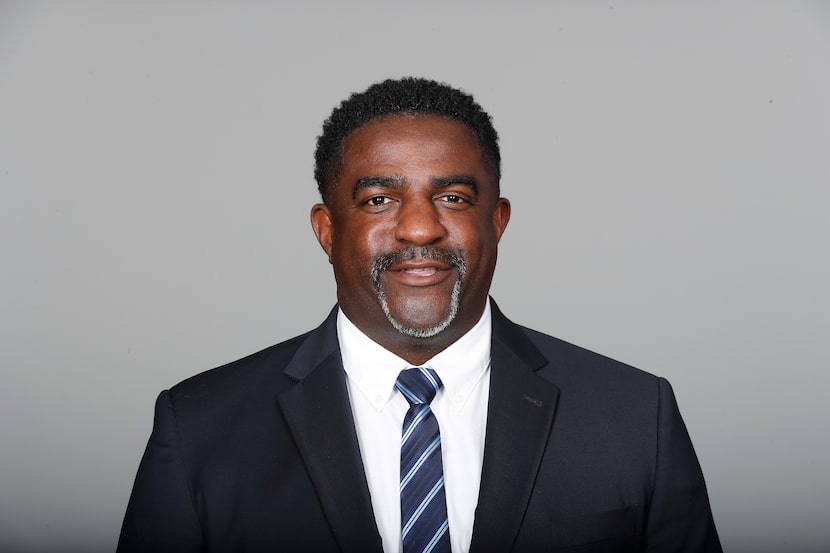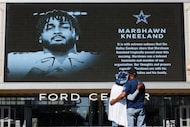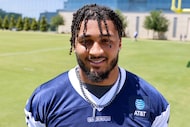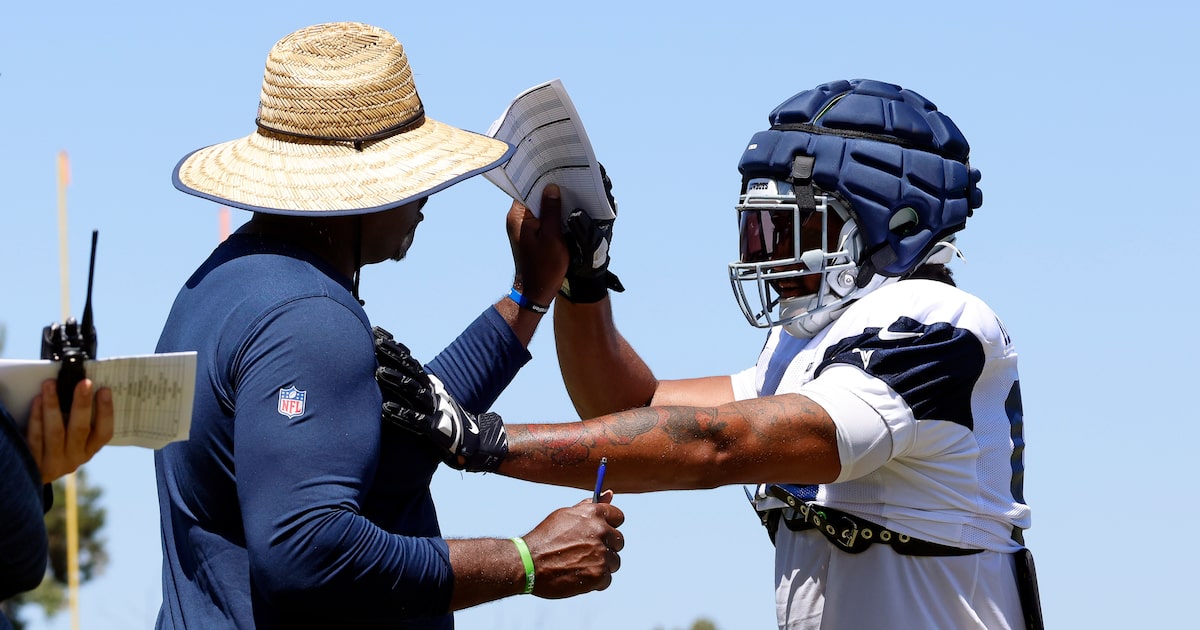Greg Ellis saw the signs and, in his mind, didn’t do enough.
Marshawn Kneeland, a player he coached as a defensive line assistant with the Dallas Cowboys, died of a self-inflicted gunshot wound Thursday.
Ellis encouraged the Cowboys’ front office to draft Kneeland from Western Michigan in the second round of the 2024 NFL draft. Kneeland reminded Ellis of himself as a player who could fit into the scheme coached by former defensive coordinator Mike Zimmer.
The two became close.
Cowboys
So close that Ellis — an advocate who wrote and directed a film on mental illness titled “My Dear” — spoke to Kneeland about his own mental health.
“For me, I should have known,” Ellis said Thursday night. “But the moments that I pay attention to him when he would withdraw, he would get quiet, and then I was like, ‘What’s going on?’ But his No. 1 answer: ‘I’m straight coach, I’m good.’ So, yes, to that again, a lot of things are hindsight. I did see it. But I didn’t think it would lead to this. But I did feel compelled to stay in contact with him, and that’s the one thing that I didn’t do well enough in my opinion.”

Greg Ellis, former Cowboys assistant coach.
Dallas Cowboys
Details from law enforcement are emerging from the night Kneeland, 24, took his own life — where his body was found, what he said to his girlfriend, and a text message to family members saying goodbye. Kneeland’s girlfriend, according to 911 dispatch audio, told officers he had a history of mental health issues.
Related

The root of Kneeland’s mental problems may never be known, but helping him cope is something Ellis was trying to do.
Ellis spent one season as a Cowboys coach before the current staff took over. He wanted to continue speaking with Kneeland and defensive end Sam Williams about football and life. But Ellis, who played 11 seasons for the Cowboys and 12 overall in the NFL, didn’t want to overstep his boundaries with head coach Brian Schottenheimer’s new staff.
The last time Ellis communicated with Kneeland was Sept. 3.
“I feel like, I wish he would have reached out to me,” Ellis said. “But it’s kind of out of sight, out of mind, and that’s where I feel like I needed to have been calling him, and the last time I talked to him by text. Then I just should have been texting him on a consistent basis. Hindsight, I wish I would have been reaching out to him a lot more and maybe that would have helped him to say, ‘Oh yeah, G let me talk to you. Let’s go and get something to eat X, Y and Z.’
“It doesn’t have to be about football. I didn’t do it.”
Ellis does not want to make Kneeland’s passing about himself. He cares about the players he’s coached and played with.
He understands the value of strong mental health, having played a physically demanding game that also takes a toll mentally. Ellis is taking classes to become more aware of the signs to help people deal with mental issues.
“That’s what type of guy Greg Ellis is,” said DeMarcus Ware, a former Cowboys teammate and NFL Pro Football Hall of Famer. “He’s a man of purpose, and a man of purpose, he doesn’t think about placement. He doesn’t think about if I’m No. 1 or not. He thinks about how good can I make that man, that’s in the locker room with me, better. He always talked about battling. He was my mentor.
“We all have to be more vocal in ways where when you see struggle it needs to be brought to the light. It’s about that time these struggles of professional athletes need to be brought to the light.”
The NFL provides programs for players who are dealing with mental health issues. The Cowboys were one of the first teams to help players with mental health, offering counseling programs.
Experts in the field of mental illness believe more should be done.
Michael Lindsey, a mental health researcher and dean of the NYU Silver School of Social Work, works with athletes from various sports. He believes the NFL should make it mandatory for players to undergo counseling the day they become professionals.
“Those who are close to the athletes, family members, friends, coaches, mentors, we are on the front lines and we need to have greater attunement on the warning signs and take them seriously,” Lindsey said. “Because suicide is on the rise and it’s becoming more commonplace in our society, I think we don’t take it seriously enough. For one, we can help people to understand what the warning signs are and what the next steps are to support that person or your loved ones, and I think the NFL should require every player to have mental health treatment at least some sessions because of the pressures of being associated with being a star athlete.”
NFL players are conditioned to play through pain and overcome adversity on a weekly basis — even when recovering from injuries. Micah Parsons, a former Cowboys defensive end who now plays for the Green Bay Packers, said he traveled to Florida to help his close friend, cornerback Trevon Diggs, rehab a knee injury to make sure he was mentally strong.
Cowboys quarterback Dak Prescott and defensive tackle Solomon Thomas created foundations to help people deal with mental illness. Both players had a sibling die by suicide.
“It’s just a pain that you don’t wish upon anybody,” Prescott said Thursday in an interview with Ch. 11 during a field dedication at his high school in Haughton, La.
Related

Mike MacCrory is a former walk-on offensive lineman with TCU and worked with the Dallas Mavericks as a mental performance coach after playing. He knows intimately what athletes go through.
“I think it’s hard to understand the pressure that athletes are under,” said MacCrory, a Frisco-based licensed professional counselor associate under supervision from Nikolaus Johnson. “They’re modern gladiators and they’re praised for the strength, their reliance is to suppress that they need help is counter to the culture that we built around athletes.”
Over the next week, Cowboys players who are on their bye before the next game Monday, Nov. 17, in Las Vegas, will begin to gather to come to terms with the loss of Kneeland. Already, players have placed flowers at Kneeland’s locker at The Star in Frisco, where the team practices.
For Ellis, he just wants another opportunity to reach out and help.
“I wish I would have done more,” he said.
Mental Health ResourcesThe Here For Texas Mental Health Navigation Line: Grant Halliburton Foundation initiative connects North Texans with mental health resources customized to each caller. 972-525-8181 or HereForTexas.com.National Suicide Prevention Lifeline: 24-hour crisis hotline at 800-273-8255. Confidential online chat is available at suicidepreventionlifeline.org.Crisis Text Line: To get 24-hour support, text “HOME” to 741741. More information at crisistextline.org.North Texas Behavioral Health Authority: 24-hour crisis hotline. 866-260-8000 or ntbha.org.Suicide and Crisis Center of North Texas: Speak to a trained counselor on the 24-hour hotline at 214-828-1000, 800-273-8255 or sccenter.org.
Find more Cowboys coverage from The Dallas Morning News here.

